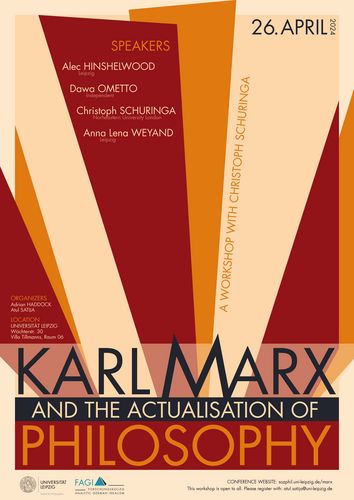Workshop
Karl Marx and the Actualisation of Philosophy
A Workshop with Christoph Schuringa.
Speakers:
Alec Hinshelwood (Leipzig)
Dawa Ometto
Christoph Schuringa (London)
Anna Lena Weyand (Leipzig)
It is indisputable that Marx began his intellectual trajectory as a philosopher. He wrote his doctoral dissertation on ancient Greek philosophy, and his early work was decisively shaped by his profound engagement with the work of Aristotle, Hegel and Feuerbach. There is scope for controversy, however, about what became of Marx’s early self-identification with philosophy as his work developed. Some have argued that Marx attempted to ‘leave’ philosophy but failed to do so thanks to his continued reliance on ‘normative’ concepts, others that he successfully performed an ‘epistemological rupture’ by which philosophy gave way to a new science without precedent.
The remit of this workshop will be to discuss a different proposal for how to understand Marx’s relationship to philosophy, advanced by Christoph Schuringa in his forthcoming book Karl Marx and the Actualization of Philosophy. According to Schuringa, Marx did not seek to abandon philosophy, or to turn it into a new science. Instead, his project was, throughout, that of the ‘actualization of philosophy’, the idea of which is already present in his doctoral dissertation. To understand his project in this way has the effect, among other things, of transforming our usual understanding of the relationship between Hegel and Marx. Marx, unlike other Young Hegelians, both stood much closer to Hegel and carried out a much more far-reaching critique of him. He understood that while Hegel’s own conception of philosophy as the unity of concept and actuality demanded philosophy’s own actualization, the philosophical work that Hegel himself carried out fell short of this demand. In the light of the actualization of philosophy, Hegel’s pretensions to what Marx comes to label ‘self-sufficient’ philosophy lie in ruins. This has implications for the tendency, today, for philosophers to Hegelianize Marx. Another consequence is that Capital, Marx’s mature (though unfinished) magnum opus can again be read in a way that was once prevalent but has become unfashionable—not as a critical theory, but as itself an instrument of the revolution. A work that actualizes philosophy, it turns out, is anything but a work of philosophical doctrine.
Interested parties are cordially invited! Please register by e-mail to Atul Satija (atul.satija@uni-leipzig.de).
